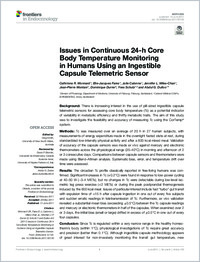Issues in continuous 24-H core body temperature monitoring in humans using an ingestible capsule telemetric sensor
- Monnard, Cathriona R. Division of Physiology, Department of Medicine, University of Fribourg, Switzerland
- Fares, Elie-Jacques Division of Physiology, Department of Medicine, University of Fribourg, Switzerland
- Calonne, Julie Division of Physiology, Department of Medicine, University of Fribourg, Switzerland
- Miles-Chan, Jennifer L. Division of Physiology, Department of Medicine, University of Fribourg, Switzerland
- Montani, Jean-Pierre Division of Physiology, Department of Medicine, University of Fribourg, Switzerland
- Durrer, Dominique Cabinet Médical COM’s, EUROBESITAS, Vevey, Switzerland
- Schutz, Yves Division of Physiology, Department of Medicine, University of Fribourg, Switzerland - Cabinet Médical COM’s, EUROBESITAS, Vevey, Switzerland
- Dulloo, Abdul G. Division of Physiology, Department of Medicine, University of Fribourg, Switzerland
-
13.06.2017
Published in:
- Frontiers in Endocrinology. - 2017, vol. 8, p. 130
English
Background: There is increasing interest in the use of pill-sized ingestible capsule telemetric sensors for assessing core body temperature (Tc) as a potential indicator of variability in metabolic efficiency and thrifty metabolic traits. The aim of this study was to investigate the feasibility and accuracy of measuring Tc using the CorTemp® system.Methods: Tc was measured over an average of 20 h in 27 human subjects, with measurements of energy expenditure made in the overnight fasted state at rest, during standardized low-intensity physical activity and after a 600 kcal mixed meal. Validation of accuracy of the capsule sensors was made ex vivo against mercury and electronic thermometers across the physiological range (35–40°C) in morning and afternoon of 2 or 3 consecutive days. Comparisons between capsule sensors and thermometers were made using Bland–Altman analysis. Systematic bias, error, and temperature drift over time were assessed.Results: The circadian Tc profile classically reported in free-living humans was confirmed. Significant increases in Tc (+0.2°C) were found in response to low-power cycling at 40–50 W (~3–4 METs), but no changes in Tc were detectable during low-level isometric leg press exercise (<2 METs) or during the peak postprandial thermogenesis induced by the 600 kcal meal. Issues of particular interest include fast “turbo” gut transit with expulsion time of <15 h after capsule ingestion in one out of every five subjects and sudden erratic readings in teletransmission of Tc. Furthermore, ex vivo validation revealed a substantial mean bias (exceeding ±0.5°C) between the Tc capsule readings and mercury or electronic thermometers in half of the capsules. When examined over 2 or 3 days, the initial bias (small or large) drifted in excess of ±0.5°C in one out of every four capsules.Conclusion: Since Tc is regulated within a very narrow range in the healthy homeotherm’s body (within 1°C), physiological investigations of Tc require great accuracy and precision (better than 0.1°C). Although ingestible capsule methodology appears of great interest for non-invasively monitoring the transit gut temperature, new technology requires a reduction in the inherent error of measurement and elimination of temperature drift and warrants more interlaboratory investigation on the above factors.
- Faculty
- Faculté des sciences et de médecine
- Department
- Département de Médecine
- Language
-
- English
- Classification
- Biological sciences
- License
-
License undefined
- Identifiers
-
- RERO DOC 305098
- DOI 10.3389/fendo.2017.00130
- Persistent URL
- https://folia.unifr.ch/unifr/documents/305914
Statistics
Document views: 187
File downloads:
- pdf: 364
